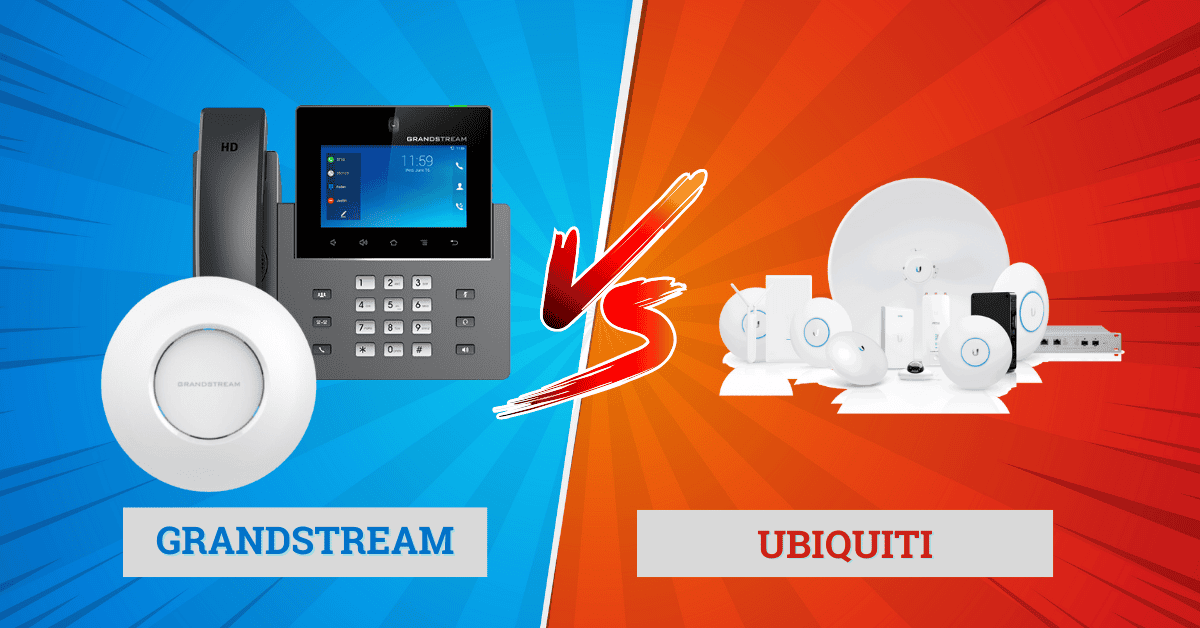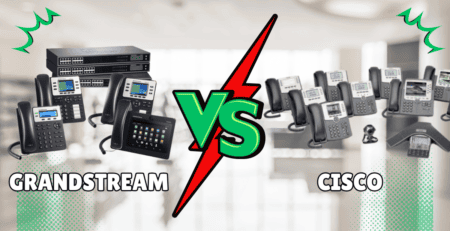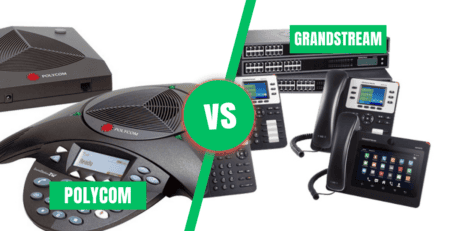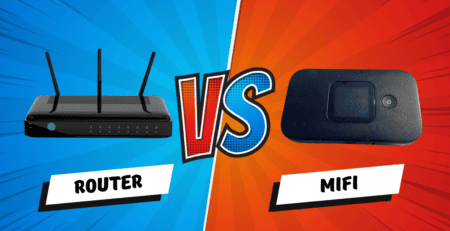Grandstream vs Ubiquiti – A Battle of Telecom Titans
Grandstream and Ubiquiti have emerged as key players in providing advanced telecom solutions to businesses of all sizes. But when choosing between these telecom titans, which one should you go for?
Grandstream offers a wide range of IP communication solutions. From IP phones and video conferencing systems to gateways and surveillance cameras, Grandstream has it all. On the other hand, Ubiquiti, renowned for its powerful and scalable networking devices, offers a suite of products including routers, access points, and switches.
As we delve deeper into this head-to-head comparison, we’ll weigh the pros and cons of each brand to help you make a well-informed decision. Whether you’re looking for reliable voice communication or networking infrastructure, join us as we pit Grandstream against Ubiquiti in this battle for telecom supremacy.
Comparing the features of Grandstream and Ubiquiti
Grandstream is renowned for its IP communication solutions, including IP phones, video conferencing systems, gateways, and surveillance cameras. Their IP phones boast a wide range of features, such as HD voice quality, advanced call handling, and support for multiple SIP accounts. The company’s video conferencing systems, such as the GVC series, provide high-definition video and audio.
Grandstream’s gateways, on the other hand, offer seamless integration between traditional telephony and VoIP networks, allowing businesses to bridge the gap between legacy and modern communication systems. Furthermore, their surveillance cameras, part of the GXV series, deliver excellent security features, including motion detection, night vision, and cloud-based management.
Ubiquiti, on the other hand, is primarily known for its powerful and scalable networking devices. Their UniFi series of access points, routers, and switches are designed to provide reliable and high-performance connectivity. These devices are renowned for their ease of deployment and intuitive management through the UniFi Controller software.
Performance and reliability of Grandstream vs Ubiquiti
When it comes to the performance and reliability of telecom solutions, both Grandstream and Ubiquiti have established a strong reputation in the industry.
Grandstream’s IP phones and video conferencing systems are known for their reliable and consistent performance. The company’s products are engineered to deliver high-quality voice and video, with features like acoustic echo cancellation, noise suppression, and advanced codec support, ensuring clear and uninterrupted communication. Additionally, Grandstream’s gateways and surveillance cameras are designed to provide reliable connectivity and secure data transmission.
One of the key strengths of Grandstream’s products is their ability to handle heavy workloads and seamlessly integrate with various telephony and networking systems. The company’s IP phones, for instance, can support multiple SIP accounts and handle a large number of concurrent calls.
Ubiquiti, on the other hand, is renowned for the performance and reliability of its networking devices. The UniFi series of access points, routers, and switches are engineered to deliver high-speed and stable connectivity, with features like advanced wireless technologies, load balancing, and seamless roaming.
In terms of reliability, Ubiquiti’s networking solutions are known for their durable construction, with many of their products rated for continuous operation in harsh environments. Additionally, the UniFi Controller software provides centralized management and monitoring, allowing IT administrators to quickly identify and address any network issues.
Pricing and cost comparison
When it comes to pricing and cost considerations, Grandstream and Ubiquiti offer different approaches that cater to the diverse needs of businesses.
Grandstream is generally known for its competitive and affordable pricing, making its IP communication solutions accessible to a wide range of businesses, from small startups to large enterprises. The company’s IP phones, for instance, are priced competitively, with models ranging from entry-level to high-end options, allowing customers to choose the features and capabilities that best fit their budget and requirements.
Similarly, Grandstream’s video conferencing systems and gateways are also priced attractively. Additionally, the company’s surveillance cameras, part of the GXV series, are often more affordable compared to some of the premium security camera brands, making them a viable option for businesses looking to enhance their physical security without breaking the bank.
Ubiquiti, on the other hand, is known for its value-for-money approach, offering high-performance networking solutions at relatively lower prices compared to some of the industry’s established players. The company’s UniFi series of access points, routers, and switches are often priced competitively.
While Ubiquiti’s networking devices are generally more affordable, the company’s VoIP and telephony solutions, such as the UniFi Voice series, are priced in a similar range to Grandstream’s IP communication offerings. This allows businesses to choose the solution that best fits their budget and communication requirements, whether they opt for Grandstream’s IP phones or Ubiquiti’s phones.
It’s important to note that the overall cost of a telecom solution goes beyond just the initial purchase price. Factors such as installation, maintenance, and ongoing operational costs should also be considered.
Support and customer service
Grandstream is known for its proactive customer support, offering a range of resources to assist businesses throughout the lifecycle of their telecom solutions. The company provides a dedicated technical support team that is available via phone, email, and online chat.
In addition to its direct support channels, Grandstream also maintains an online knowledge base, including user manuals, application notes, and video tutorials. This extensive library of resources allows customers to find answers to common questions and troubleshoot issues on their own.
Grandstream also offers various training and certification programs, empowering customers and partners to develop a deeper understanding of the company’s products and solutions. These programs cover topics such as installation, configuration, and advanced features.
Ubiquiti, on the other hand, is renowned for its community-driven support model, which has been a key factor in the company’s success. The Ubiquiti community forum is a vibrant and active platform where users, partners, and Ubiquiti experts collaborate to share knowledge, troubleshoot issues, and provide guidance on various networking and telecom-related topics.
While Ubiquiti does offer direct support channels, such as email and phone support, the company’s community-driven approach has been highly effective in addressing customer needs. The Ubiquiti community forum is often the first point of contact for many users, where they can find solutions, share best practices, and engage with a knowledgeable and responsive community.
In addition to the community forum, Ubiquiti also provides comprehensive documentation, including user guides, technical specifications, and video tutorials, enabling customers to quickly find the information they need to set up, configure, and maintain their Ubiquiti telecom and networking solutions.
Integration and compatibility with other telecom systems
When it comes to integrating and ensuring compatibility with other telecom systems, both Grandstream and Ubiquiti have made significant strides to provide seamless solutions for businesses.
Grandstream’s IP communication solutions, including its IP phones, video conferencing systems, and gateways, are designed to be highly interoperable, allowing for easy integration with a wide range of third-party telecom systems and platforms. The company’s products support a variety of industry-standard protocols, such as SIP, SRTP, and HTTPS, ensuring compatibility with a diverse range of VoIP service providers, PBX systems, and unified communication platforms.
Grandstream’s gateways, in particular, play a crucial role in bridging the gap between traditional telephony and modern VoIP networks. Furthermore, Grandstream’s surveillance cameras, part of the GXV series, can be easily integrated with various video management systems (VMS) and physical security platforms.
Ubiquiti, on the other hand, is known for its focus on creating a cohesive and integrated networking ecosystem with its UniFi product line. The company’s access points, routers, and switches are designed to work seamlessly together, allowing businesses to build a scalable and centrally managed network infrastructure.
When it comes to telecom integration, Ubiquiti’s UniFi Voice series of VoIP phones and telephony systems are engineered to integrate seamlessly with the company’s networking solutions, providing a unified communication platform.
Which telecom titan is right for your business?
When it comes to choosing between Grandstream and Ubiquiti for your business’s telecom needs, there is no one-size-fits-all answer. The decision will depend on a variety of factors, including your specific communication and networking requirements, the level of integration needed with your existing systems, and your overall budget and operational considerations.
If your business is primarily focused on reliable IP communication solutions, Grandstream may be the better choice. The company’s comprehensive range of IP phones, video conferencing systems, gateways, and surveillance cameras offer a wide array of features and capabilities.
On the other hand, if your business places a greater emphasis on building a cohesive and scalable networking infrastructure, Ubiquiti may be the more suitable choice. The company’s UniFi series of access points, routers, and switches are renowned for their high-performance and reliable connectivity. A
It’s important to note that while Grandstream and Ubiquiti have their respective strengths, the decision should not be based solely on the features and capabilities of the individual products. Businesses should also consider the overall integration and compatibility requirements, as well as the long-term cost implications, including installation, maintenance, and operational expenses.
Regardless of the choice between Grandstream and Ubiquiti, both telecom titans offer reliable solutions that can help businesses enhance their communication, collaboration, and networking capabilities, ultimately driving greater productivity and success.












